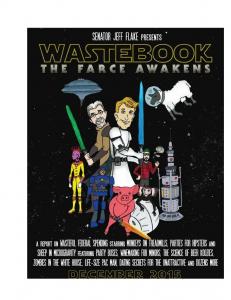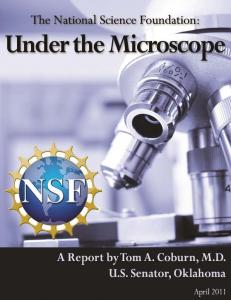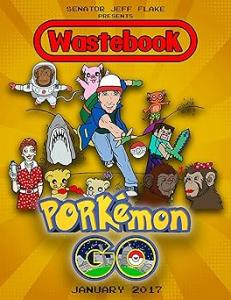Congressional Budget Cutting Activities in Science Preceded DOGE
Multiple Congressional Books Named "WASTEBOOK" Listed Hundreds of Federal Grants in Science Years Ago
GAINESVILLE, TX, UNITED STATES, June 21, 2025 /EINPresswire.com/ -- Some people are still expressing surprise and misgivings about the formation of the Department of Government Efficiency (DOGE) and its budget cutting activities. Some attention from that was devoted specifically to projects and funding identified by Texas Senator Ted Cruz’s examination of National Science Foundation grants, with emphasis placed on the incorporation of DEI activities. Sen. Cruz identified as inappropriate 3483 of these reviewed NSF grants, given to support science projects. Some scientists have been and are still concerned about the scrutiny and judgement of these grants.
Such scrutiny and judgement of federal grants by members of Congress has been done before. These activities were published previously, although the activities may have been forgotten because they first started several years ago. In April 2011, Oklahoma Sen. Tom Coburn compiled the first report, “Under the Microscope,” which detailed NSF grant "waste." This report effectively warned scientists who submitted grants and their universities.
After Sen. Coburn retired for health reasons, Arizona Senator Jeff Flake began reporting what he identified as waste in funded federal grants with “Wastebook: The Farce Awakens” in December, 2015. As insinuated by the Star Wars-inspired title, this was done with the intention to be humorous. This report highlighted 100 examples of "wasteful federal spending," mostly in science, amounting to more than $100 billion.
Sen. Flake was responsible for all the "wastebooks" published by the U.S. Congress after Sen Coburn's initial publication. During Sen. Flake's 10 years in the Senate, his "Wastebooks" resulted in the government canceled hundreds of millions of dollars in spending.
NSF countered the criticism in a formal response published at the NSF website. However, fourteen months later, this was followed by Senator Flake’s “WASTEBOOK: Porkemon GO” in January, 2017. Again, as insinuated by the Pokemon Go mobile game inspired title, this was his humorous evaluation of science grants considered to be wasteful. Each successive "Wastebook" uses stronger language in the evaluation and criticism, as the perceived waste is being repeated.
Now, more members of Congress are taking part in the evaluation of federal grants which they say are inappropriate, in ways which are receiving more publicity than before. Also, the review of grants for waste and cancellation has been assigned to another entity -- DOGE. Grants considered inappropriate are once again being identified, except this time some grants are also being cancelled.
This information about the similar preceding activities may help to put the current actions into perspective.
DR. DONNA J. NELSON
Dr. Donna J. Nelson
+1 617-290-0158
email us here
Visit us on social media:
LinkedIn
Facebook
YouTube
X
Other
Legal Disclaimer:
EIN Presswire provides this news content "as is" without warranty of any kind. We do not accept any responsibility or liability for the accuracy, content, images, videos, licenses, completeness, legality, or reliability of the information contained in this article. If you have any complaints or copyright issues related to this article, kindly contact the author above.
Candice Bourne Joins Women in Power TV to Share Her Vision for Building Success from Scratch
AI CERTs® & Cyber Future Foundation Partner to Deliver Responsible AI Certification Programs for Security Professionals
Martijn Gribnau Joins Quant's Executive Board to Accelerate AI-Driven Customer Contact Transformation
Więcej ważnych informacji
 Jedynka Newserii
Jedynka Newserii

 Jedynka Newserii
Jedynka Newserii

Finanse

K. Gawkowski: Polska w cyfrowej transformacji gospodarki awansowała do pierwszej ligi w Europie. 2,8 mld zł z KPO jeszcze ten proces przyspieszy
Uruchomiony na początku lipca przez Ministerstwo Cyfryzacji i BGK program „KPO: Pożyczka na cyfryzację” cieszy się dużym zainteresowaniem. Samorządy, uczelnie oraz firmy mogą wnioskować o wsparcie finansowe dla inwestycji w transformację cyfrową, m.in. modernizację infrastruktury czy cyberbezpieczeństwo. W sumie na ten cel trafi 2,8 mld zł (650 mln euro). Ze względu na krótki czas naboru obie instytucje organizują w poszczególnych województwach warsztaty dla wnioskodawców, które mają rozwiać ich wątpliwości przy przygotowywaniu wniosków.
Prawo
Koszty certyfikacji wyrobów medycznych sięgają milionów euro. Pacjenci mogą stracić dostęp do wyrobów ratujących życie

Od 2027 roku wszystkie firmy produkujące wyroby medyczne w Unii Europejskiej będą musiały posiadać certyfikat zgodności z rozporządzeniem MDR (Medical Devices Regulation). Nowe przepisy wprowadzają dużo ostrzejsze wymagania w zakresie dokumentacji, badań klinicznych oraz procedur certyfikacyjnych. Branża ostrzega, że część małych i średnich producentów nie zdąży się dostosować. Problemem jest także wysoki koszt i długi czas uzyskiwania certyfikatów. W konsekwencji z rynku mogą zniknąć urządzenia ratujące życie.
Infrastruktura
Nowe przepisy o ochronie ludności cywilnej wprowadzają obowiązkowe elastyczne zbiorniki na wodę. Mają one służyć w razie suszy, pożarów czy wybuchu wojny

Samorządy będą musiały posiadać m.in. elastyczne zbiorniki na wodę pitną i przenośne magazyny wody przeciwpożarowej. To element odpowiedniego przygotowania zasobów na wypadek sytuacji kryzysowych, kataklizmów czy wybuchu konfliktu, wprowadzony nowymi przepisami o ochronie ludności. Eksperci podkreślają, że tego typu rozwiązania to innowacyjne produkty, które nie tylko ułatwiają logistykę w sytuacjach kryzysowych, ale także mogą znacząco skrócić czas reakcji służb ratunkowych.
Partner serwisu
Szkolenia

Akademia Newserii
Akademia Newserii to projekt, w ramach którego najlepsi polscy dziennikarze biznesowi, giełdowi oraz lifestylowi, a także szkoleniowcy z wieloletnim doświadczeniem dzielą się swoją wiedzą nt. pracy z mediami.










.gif)

 |
| |
| |
|